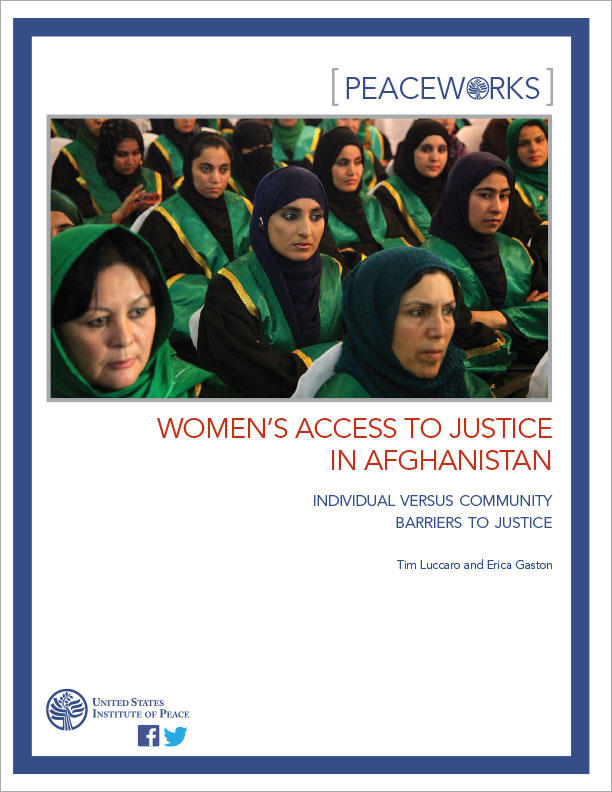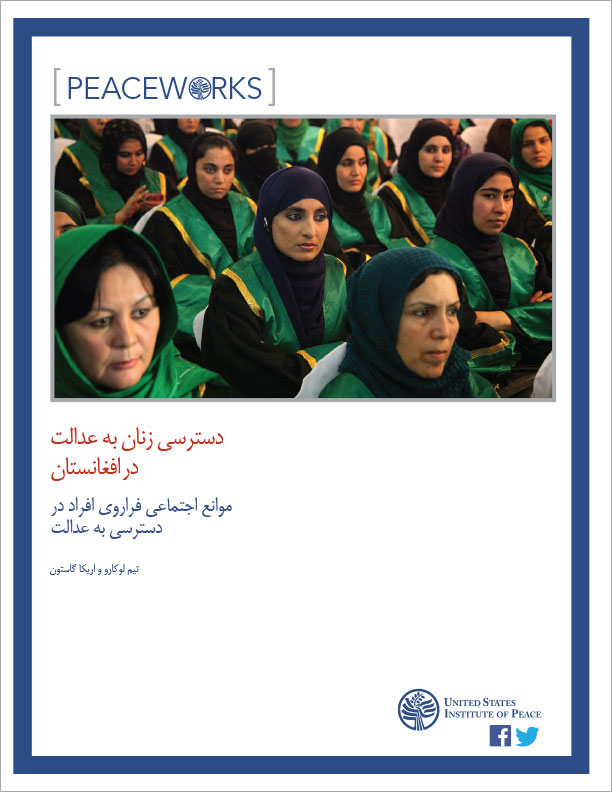Since the fall of the Taliban in 2002, gains in women’s rights and access to justice in Afghanistan have been remarkable, yet women’s rights remain extremely limited. How do women in Afghanistan seek justice when their rights are violated? What barriers do they face in pursuing justice or receiving a fair outcome? This report draws on interviews and focus group discussions held in Afghanistan in 2011 and 2012 to determine answers to these and related questions and to recommend ways forward.
This report is also available in Dari.
Summary
- Protecting women’s rights and expanding women’s access to justice has been a major priority for the international community, the Afghan government, and Afghan women’s advocates since the fall of the Taliban in 2002.
- Awareness of women’s rights, women’s participation in public life, and women’s access to education and healthcare have increased significantly. Meanwhile, government, legal aid, and psychosocial and shelter services for women have expanded dramatically.
- This level of progress in roughly a decade’s time is remarkable in a country where conservative cultural norms, ongoing violence and conflict, and a poor economic situation might have augured for much slower progress.
- Despite these gains, protection of women’s rights and women’s access to justice remain extremely limited. Few Afghan women resort to state mechanisms or nongovernmental organization (NGO) services. Deeply ingrained social norms dissuade women from asserting their rights. Reporting abuses would trigger social stigmatization and the loss of social or economic safety nets.
- In some communities, social taboos against external intervention limit both men and women from seeking state or NGO help. These collective barriers continue to frustrate rights- or individual-based approaches to access to justice.
- Women predominantly address their justice needs within their families or communities, but even there, a number of normative, consequential, and practical barriers prevent women from seeking or receiving justice.
- Understanding how these barriers affect women’s decision making is critical to expanding access to justice. Decisions that appear ill-advised because they forfeit rights are often based on a rational appraisal of the limited opportunities for justice and the likely consequences of seeking it.
- Greater consideration for the community context and the barriers women face will be critical in the coming period given the expected reduction in support and reach for state and NGO services following international troop withdrawal in 2014.
About the Report
This report maps how Afghan women seek justice when their rights are violated and the barriers women face in pursuing justice or receiving a fair outcome, whether in the formal system, in community-based mechanisms, or at home. Part of ongoing research and programming by the United States Institute of Peace (USIP) on how community-based approaches can improve women’s access to justice, this report is based on a time-limited ethnographic study of women’s disputes in five provinces of Afghanistan between March 2011 and January 2012. This study was conducted in cooperation with the Women Activities and Social Services Association, the Organization for Human Welfare, and the Afghanistan Human Rights and Democracy Organization. It was funded by the U.S. Agency for International Development’s Office for Democracy and Governance and the U.S. Department of State’s Bureau for International Narcotics and Law Enforcement.
About the Authors
Tim Luccaro, USIP’s senior program officer in Afghanistan for three years, has worked on issues related to tradi-tional dispute resolution, women’s access to justice, and nonviolent conflict resolution in Afghanistan since 2010. Previously, on behalf of USIP, he focused on traditional dispute resolution for USIP in Liberia and South Sudan. Erica Gaston is a human rights lawyer with seven years of experience in programming and research in Afghanistan on human rights and justice promotion. Her recent academic and policy publications include three books on the legal, ethical, and practical dilemmas emerging in modern conflict and crisis zones; studies mapping justice systems and outcomes in Afghanistan and Yemen; and thematic research and opinion pieces on rule of law issues in transitioning countries. Field research was conducted primarily by USIP staff Reyhaneh Hussaini and Farid Bayat. Nina Sudhakar contributed initial data analysis.

